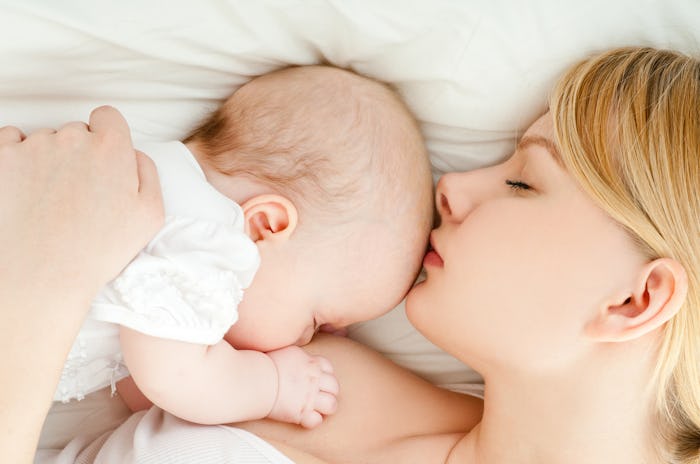Breastsleeping — it's the hot new trend. But the thing is, it's not. It's been around since the dawn of time. In fact, at some point breastsleeping was just . . . sleeping. It was how your ancestors cared for their own children, but its comeback still feels pretty revolutionary after years of bottle-pushing and suggesting children sleep in their own beds. So how does breastsleeping affect your kid later in life?
Spoiler alert: it's really hard to say. But, in general, breastsleeping isn't going to turn your baby into an adult that refuses to sleep alone and wants to breastfeed at 40. Dr. Cecilia Tomori, anthropologist with postdoctoral training in public health, Research Associate at the Johns Hopkins Bloomberg School of Public Health, and author of Nighttime Breastfeeding: An American Cultural Dilemma tells Romper that the concept of breastsleeping reflects what scientists know about the evolutionary context of human infant feeding and sleep. "It is essential to think about the selection pressures, such as natural selection, in our evolutionary history that are at play here — we need to consider breastsleeping and all the complex physiological interactions in this concept as adaptations that ensured the survival of human infants," Tomori says. When you think of breastsleeping as a natural, evolutionary way to feed your baby and get them to sleep, wondering how it will affect your child later in life seems like an overwhelming concept. How will anything affect your child later in life? Will your love and protection give them confidence? Will your support of them give them strength? Will putting them in sports make them team players?
If you break down breastsleeping and look at what it is in the most basic terms — bed sharing and breastfeeding — then you can get a more specified look at the effects of it. But here's the thing, bed-sharing in general isn't 100 percent responsible for any future effects on your baby. One study determined that any negative behavioral or cognitive outcomes from a study on babies who shared a bed with their mother couldn't be associated with bed-sharing — there are too many variables. Sociodemographic characteristics applied there and there's no way of knowing if bad behavior or poor cognitive skills are linked 100 percent to bed-sharing, a key component of breastsleeping.
Co-sleeping generally doesn't have too many negative outcomes — much like that one study on bed-sharing, there are too many factors to consider. A child with behavior problems have been co-sleeping with their parents, but were their parents happy in their marriage? Did they physically discipline their child? Were they teen parents? Did the child have a traumatic event happen to them? The same can be said for any positive effects of co-sleeping as well. Without more information on the way a child is raised or their life, it's hard to say if bed-sharing specifically gave them the power to be confident, smart, or well-adjusted.
But breastfeeding? That's obviously a huge part of breastsleeping and it can directly affect your kid later in life. According to Dr. Sears, breastfeeding can reduce your child's risk of illness later in life, including heart disease and obesity, as well as increase their chance of having healthy teeth.
Combined, there's not a lot of research on what breastsleeping in its entirety does to a child later in life. Attachment Parenting International noted that by the age of 6 years old, babies who bed-shared had increased cognitive capacities, were generally happier and less fearful, and became young adults that were more optimistic. But, as with any parenting decision, this is all based on more than just breastsleeping, so do whatever feels right for you and your baby. If breastsleeping makes your skin crawl, any positive outcome on your baby could be lost. If breastsleeping is the one thing you desperately want to do, it could help make your baby more confident and more reassured as they grow.
Or it could just help both of you get more sleep, which definitely has a positive impact on your kid later in life. (And yours, too.)
